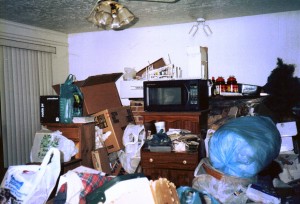 One of the services we offer is hoarding resolution, both for those who suffer from the disorder and their families too. Our experience has taught us that there is no “one-size-fits-all” method for helping a hoarder because each person is uniquely different. However, we have picked up a few helpful tips along the way.
One of the services we offer is hoarding resolution, both for those who suffer from the disorder and their families too. Our experience has taught us that there is no “one-size-fits-all” method for helping a hoarder because each person is uniquely different. However, we have picked up a few helpful tips along the way.
We will share those tips with you in the following paragraphs. However, please remember that hoarding is a serious psychological condition that ultimately requires professional help to overcome. The hoarder in your life is not just a messy person who lacks organizational skills. He or she is a person with an obsessive-compulsive disorder that he or she does not know how to deal with.
Here are a number of tips you might be able to put to use in your situation:
#1 – Research
Before you attempt to do anything to help your loved one, make sure you do research into the hoarding disorder. The more you understand it, the more capable you will be of offering whatever assistance you can. There are plenty of good books and online resources available; make good use of them. Moreover, never be afraid to ask questions of professionals who have dealt with the issue.
#2 – Get Help
Very few people can deal with a hoarding disorder without professional help. What kind of help are we talking about? First, there’s the psychological help provided by a trained counselor familiar with obsessive-compulsive disorders. One who specializes in hoarding is even better.
Another kind of help comes from a company like ours. My Divine Concierge has years of experience helping hoarders and their families resolve the physical and practical issues of the disorder. We come in and help go through all the individual’s possessions, organize and store those things that will be kept, dispose of the rest, and then clean up the house as best we can. A hoarding resolution service like ours may mean the difference between your loved one remaining in his or her home or their home being condemned by public health officials.
#3 – Be Patient
Once the decluttering process begins, many family members of hoarders expect it to be completed in just a day or so. In reality, things rarely work out that way. Decluttering is a long process that seeks to not only clean up the mess and get rid of excess property, but also teach the individual how to make better decisions. This can take some time. The time element is another reason the hoarding resolution service we provide is so valuable.
#4 – Encourage Progress
The early stages of decluttering involve many decisions the hoarding individual has trouble making. Nevertheless, as with anything else, practice makes perfect. It is helpful if you encourage the individual for making good decisions along the way. The more encouragement he or she receives, the more they will be willing to make those positive decisions everyone is looking for.
#5 – Be Careful of Judgments
To the hoarder, every piece of personal property is vitally important. It does not do you any good to constantly judge for yourself what is valuable and what’s not. And in fact, that’s a good way to make yourself crazy. Just accept the fact that the hoarder sees all of his or her property as necessary, unless a valid reason to the contrary is presented. Your job, and ours for that matter, is to simply walk the individual through the process of establishing some priorities, helping the individual to understand that not everything can be kept because there simply isn’t enough space. By establishing priorities, we can establish what will be saved and will be disposed of.
We hope you find these tips helpful if you are dealing with a loved one suffering from a hoarding disorder. Please bear in mind that we are not experts in treating obsessive-compulsive behavior. We are experts in personal concierge services, including hoarding resolution. Please get in touch with us if you need help decluttering and cleaning up in a hoarding situation.
